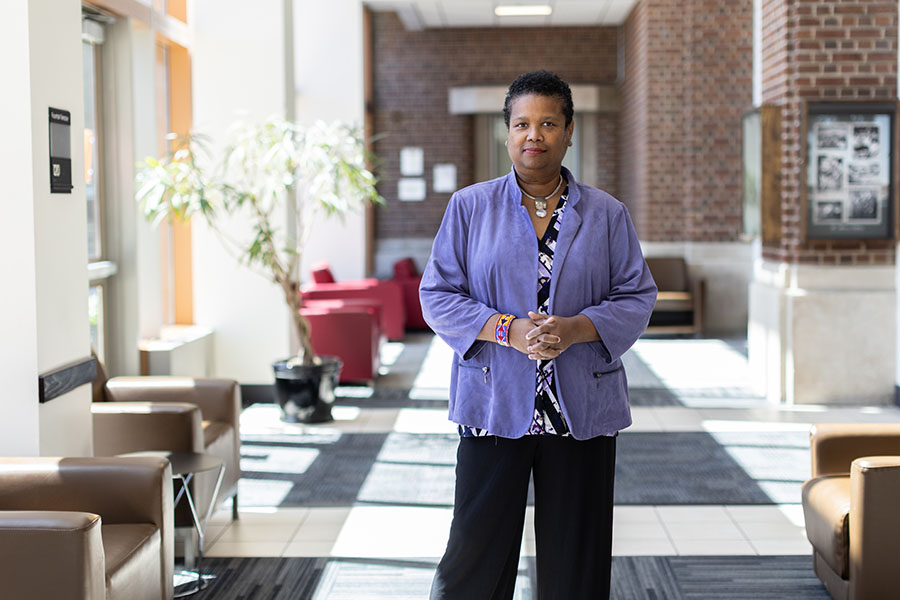Commit
Using “commit” emphasizes a pledge to prioritize antiracist efforts in making SPH a more welcome, equitable, and just organization.
What do you see as your role in antiracism?
“One of my key roles is to reflect on the work that we do in the SPH Center for Healthy Aging and Innovation (CHAI) to ensure we are focused on the communities with the greatest need. Racism is a fundamental contributor to health inequity. By focusing first on the communities facing the greatest inequities and disparities, many others will benefit.
How are you thinking about this work broadly across the University?
The U of M has a wealth of assets, including scholars, faculty, staff, research, technology, educational classes, and clinical capabilities. One of my commitments is to facilitate the co-creation of a community-academic engagement model with the CHAI community advisory board that connects people and resources to support initiatives that are community priorities.
Sometimes the University gets the reputation that it does research in the community, then leaves and doesn’t circle back. I want to be very conscious and intentional with the work that we do in CHAI so that we don’t do harm in the community. We need to be active listeners and hear what community members identify as most important, and then we need to support them on projects they believe contribute to healthy aging.
What is one thing CHAI has done to work toward antiracism?
One of the important things we have done is build a budget to support community engagement. Often the community says: ‘Nothing for us, or about us, without us.’ Providing a stipend for community members acknowledges that the time they spend with us is precious and we value their lived experiences, because we can’t do this work without them.
How do you commit to antiracism in an ongoing way in your work?
I commit to continuous education. When I meet with a new community group that I haven’t had any personal or professional experience with, I do my homework. I review their website, read their articles and annual report, attend cultural events, and study some of their core cultural traditions to better understand their community and their goals. Cultural humility is a core practice, and investing time to prepare shows respect and creates more authentic and productive conversations.”
Challenge
We are “challenged” to accept that racism exists and to “challenge” it when we see it.
How are you challenging yourself in antiracist work?
“I challenge myself by reflecting on how I think about people or certain cultural groups. I try to avoid labelling people as racist based on a single encounter or disagreement. I believe that we all carry a certain amount of bias and prejudice; therefore, we need to challenge the assumptions we are making by practicing cultural humility.
I challenge antiracism in the context of identifying, sharing, and co-developing recommendations on the changes required in the systems, structures, resource allocations, and policies that disadvantage Black, Indigenous, and people of color. I continuously ask if we have the people most directly affected at the table and if we are centering on the margins to elevate voices that are often unheard.
How can people build better relationships with communities?
Listen. Listen. Listen.
We should also avoid judgement, blame, and shame which can make some people feel like they are the problem or that the solution rests solely in individual choices. It can also leave people feeling that there is little hope due to the breadth and depth of disparities in their community.
We must grow our understanding of how the roots of structural racism and inequities have contributed to historical trauma and disadvantage the health and quality of life and care for Black, Indigenous, and people of color and other marginalized communities.
We can use an asset-based approach to develop an understanding of the community information, stakeholders, resources and organizations that are already in place to meet the needs.
And we need to invest in developing and nurturing long-term relationships that are authentic and mutually beneficial.”
Change
We have to be willing to “change” and shift our beliefs, attitudes, and actions toward equity and justice.
What is your vision for an antiracist school of public health?
“It’s a place that is welcoming and inclusive of everyone. It’s a place where everybody counts and everybody matters. It’s a place that invests in and supports our faculty, staff, students, and alumni and recognizes that everybody is valuable.
It’s a place where we truly believe our collective lived experiences, knowledge, and professional training will bring unique perspectives, greater insights, and creative problem-solving to mitigate or eliminate barriers of health and healthy aging.
It’s a place where we are going to make mistakes because we’re all growing, learning, and listening. But when people do make mistakes, we’re able to address it without attacking them. Instead, we’ll be focused on the behavior and how the behavior does/does not fit with this culture.”
What is the most important ingredient for culture change?
“The most important ingredient is believing that everyone will be doing better — and we will accomplish our school’s mission more successfully — if everyone is given an opportunity to participate and thrive.
We need to understand that this isn’t about being nice or woke, it is about us bringing together the collective assets and people that we have to improve the lives across our communities, our state, our nation, and our world.”
“Building Equity, Driving Justice: Commit | Challenge | Change” — ties all communications related to the SPH Strategic Plan for Antiracism together under one look and feel. The theme showcases our guiding principles, and it motivates and inspires. "Agents for Change" profiles support this theme and all interview questions are related to the action words, Commit, Challenge, Change, as described above.
Submit an idea for this profile series — either your own story, or one that inspires you from another SPH individual or group.

